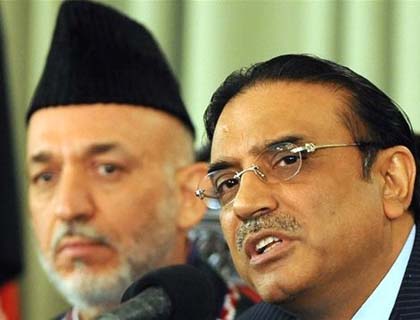On Monday, Pakistani President, Asif Ali Zadari, and his Afghan counterpart, Hamid Karzai, said that they would try their best for realization of peace negotiation within coming six months.
David Cameron, the British prime minister who hosted the meeting also uttered that both of his guests have reached into visible agreements.
However, both Presidents have agreed on opening of a political office in Doha, but details about the central issues of trilateral meeting such as militancy and cross border insurgents’ activities have remained mind-aching. However, it was alleged that they agreed to deal with the problem but it is not clear how they are going to do so.
Will their governments set aside all former linkages, friendship and political and strategic consideration and turn the spearhead of their efforts towards militancy and insurgency? Will Asif Ali Zardari and
President Karzai finally decide to cooperate with each other in wiping out the root cause of insecurity and instability---Taliban-like minded groups through promulgation of peace or military operation on their hideouts? The answer of these questions will be unraveled in explaining effective bilateral relationship. First of all, the dominant suspicion and distrust between Kabul and Islamabad developed during years and may not, in effect, leave a sphere for the light of friendship and cooperation to sparkle. Heads of both countries time and again point fingers towards one another for claimed insincerity and double-game play. But when it comes to diplomacy, they always draw a somehow different portray of their relationship and highlight the issues which taste sugary to mouth as noticed in Monday’s meeting. No doubt, Kabul and Islamabad have come to an understanding that the national interests of one linked to peace and stability of another, but the suspicious gaze never takes eyes off the scenario. Who may reject that elimination of Taliban from neighboring Afghanistan would not weaken Pakistani Taliban and does not strengthen the position of Pakistani security forces on the presently disobedient tribal agencies? Who doubts a faded radicalism and fundamentalism would not affect our neighbor that pays huge price for growing sectarian violence? Who opposes the notion that stable and prosperous Afghanistan benefits Pakistan tremendously through channeling giant natural resource of Middle Asia to Indian Ocean and Arabian Sea? Who can reject that return of more than two million Afghans back to their country if the peace gets restored would not increase the job opportunities for millions of Pakistani wandering in the employment market? Perhaps, the answer to above questions is a nod of acceptance. Everybody accepts that Pakistan will benefit from stable Afghanistan rather than an instable one. So, over all above mentioned benefits and interests that stable Afghanistan will bring about, why we are not witness to serious efforts of Islamabad to end ongoing dilemma in Afghanistan? (However, it should be noticed that Pakistan has always emphasized on its sincerity and serious efforts to bring peace in the country). Considering the first option; definitely, there are issues which make Islamabad to pause and reconsider that where they may finally end up. After 2001, India has developed a very close tie with Kabul. However, president Karzai once told that India is our friend and Pakistan is a brother which clearly hinted on his struggle to deliver a strong message of enduring relation between Kabul and Islamabad. On that time, I was in India and many Indian newspapers wrote in bold his statement, alarming Delhi to more cautious in tightening the relationship with Kabul.
Seemingly, neither Islamabad took the statement seriously nor Delhi. Indian companies are deeply busy investing in the country in billions of Rupees. Recently, both countries signed strategic cooperation agreement. India announced its preparation to support and train Afghan security forces.
Flights between Kabul and Delhi have increased and booking of tickets have become difficult for passengers due to higher demand. Referring to Delhi hospitals, some Indians talk hesitant Dari which is sign of their high communication with Afghan people. Hindi Movies and Serials are the most viewed films in comparison to any other country. Though Iran has cultural and lingual similarity, but viewers of its films and movies are not a match to Indians.
In addition, annually, around a thousand of Afghan students receive Indian scholarship or go there on self-finance to pursue their higher education across the country who after returning to the country feel too close to Indian culture and tradition. Due to institutionalization of individualism and liberalism, I know many Afghan students who try their best to extend visa to remain in India for longer period. It is really a hard to find a student who graduated from an Indian university to oppose the growing presence of India to a level that does not endanger national interest. Definitely, if the situation goes on, at the current basis, Indian will turn into the main target of Afghan patients to be treated, students and tourists due to the country’s competitive relative lower overall expense.
On the other hand, Pakistan is increasingly losing the ground. It was once the main target of Afghan patients due to lack of professional doctors inside the country. It is not now frequent that an Afghan student seeks admission in Pakistani university through self-finance. However, it provides scholarship but the result has not been eye-catching at all. Many students who were accepted in such scholarships avoided to go. Some students who went, returned complaining about lack of educationally conducive environment.
Now just review the above mentioned issues which mostly set on move after 2001, what sense you may find if you were a Pakistani official? No doubt, the concern of Pakistan officials is understandable. India is their arch-foe. The tense relationship popped up after partition continues and the prospective does not look promising at all. So, what if Delhi and Kabul become too close and leave Islamabad away? On such case, it would be encircled by its arch-rival and would have nothing to challenge India’s might.
To be continued..

